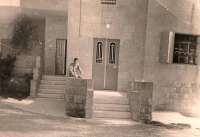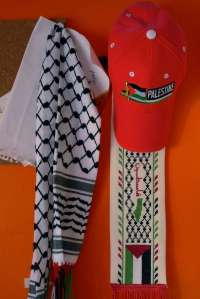This project is a way of mapping a home I have never been to from the outside. It is about the outside world not recognizing my identity as a Palestinian, or my people's right to their homeland. In that sense, it is unrealized.
31°53’20.24”N, 35°10’03.12”E Somewhere in this vicinity exists a house. A house that belongs to us. My family. My dad’s dad. My dad. His family. Us. It is 2 miles west of Ramallah and 9 miles north of Jerusalem. A town called Beitunia. We cannot live there. He cannot live there. Does the house still belong to us? Did it ever? Our family name has been removed. It’s pretty cool that the homes there are marked with the family name; that is, until yours is replaced.
I ask my dad, “Do you have any other pictures of Falasteen besides the one of you in front of the house?” He says, “No.” I ask, “Why not?” He just says, “ I don’t know.”
The town of Beitunia is 2,617.4 hectares. I don’t really know how large that is, and it’s not really important for me to find out, but only 336.2 hectares are built up, partially because much of it is farming land and partially because The Separation Wall, or the Apartheid Wall, separates the urban area of Beitunia from 66% of it’s land. Some of this land is top-quality agriculture and grazing land. Shocker.
Beitunia has a web page, but it’s all in Arabic. It would take me literally forever to read it and I would only understand a fraction. A disconnection, but there exists a reconnection. Most of the original inhabitants of Beitunia are in Chicago. My lack of Arabic still separates me from some, while the English conversations with others disconnect us from the origin. Language. It still separates. Barriers. Disconnections. Disconnection in its highest form.
It’s funny to own a bunch of objects related to a place, as if those objects can fill a hole in your heart; as if objects can make you rooted in a place; as if objects somehow provide a solid connection. A connection? Maybe. One that is not linear; one that is often disjointed. Discontinuous. Non contiguous. Virtual.
These objects are not meant to fill a hole. Only going to a place, living in a place, can seal it. I know. Are they meant to be reminders? Possibly. Are they meant to make you feel like you belong to something? Possibly.
A world-wide unrecognized place exists. It has an unrecognized map, an unrecognized flag with unrecognized objects and unrecognized people. While maps represent people, supposedly, and people need maps to feel represented, supposedly, a place does not need a physical map in order to exist. One does not need a map to exist, nor to feel a connection.
I have a connection. A weak connection. People and objects provide me with a connection. To an unrecognized place. An unrecognized territory. An unrecognized life. A life I attempt to fill. To create. One whose details I sometimes cannot remember. One whose details sometimes don’t matter. One.
Are all objects that are meant to connect you to a place branded? Does the object need a flag for authenticity? A flag for representation? A flag for belonging? Can one not connect to a place, see a place, feel a place without a visible national branding? Many of these objects are nationalistic in nature. Something that I almost find silly right now. It seems as though the objects that are meant to connect you to Palestine are heavily branded, but isn’t that only because it is an unrecognized nation? An unrecognized people? An unrecognized flag? A Cause? A Struggle? Are these objects meant to say, “We exist”? Do I have these objects because I want to reinforce its existence? Do I have these objects because I feel closer to the place? A little less uprooted? A little more…there? I realize these objects hold little meaning, yet, I try to find some meaning in them. People make the connection. People. The unrecognized people exist. They are recognized by people who are recognized. People like me. People who are recognized in the wrong place. Uprooted. Unrecognized.
I am unrecognized.
This project is a way of mapping a home I have never been to from the outside. It is about the outside world not recognizing my identity as a Palestinian, or my people's right to their homeland. In that sense, it is unrealized.
31°53’20.24”N, 35°10’03.12”E Somewhere in this vicinity exists a house. A house that belongs to us. My family. My dad’s dad. My dad. His family. Us. It is 2 miles west of Ramallah and 9 miles north of Jerusalem. A town called Beitunia. We cannot live there. He cannot live there. Does the house still belong to us? Did it ever? Our family name has been removed. It’s pretty cool that the homes there are marked with the family name; that is, until yours is replaced.
I ask my dad, “Do you have any other pictures of Falasteen besides the one of you in front of the house?” He says, “No.” I ask, “Why not?” He just says, “ I don’t know.”
The town of Beitunia is 2,617.4 hectares. I don’t really know how large that is, and it’s not really important for me to find out, but only 336.2 hectares are built up, partially because much of it is farming land and partially because The Separation Wall, or the Apartheid Wall, separates the urban area of Beitunia from 66% of it’s land. Some of this land is top-quality agriculture and grazing land. Shocker.
Beitunia has a web page, but it’s all in Arabic. It would take me literally forever to read it and I would only understand a fraction. A disconnection, but there exists a reconnection. Most of the original inhabitants of Beitunia are in Chicago. My lack of Arabic still separates me from some, while the English conversations with others disconnect us from the origin. Language. It still separates. Barriers. Disconnections. Disconnection in its highest form.
It’s funny to own a bunch of objects related to a place, as if those objects can fill a hole in your heart; as if objects can make you rooted in a place; as if objects somehow provide a solid connection. A connection? Maybe. One that is not linear; one that is often disjointed. Discontinuous. Non contiguous. Virtual.
These objects are not meant to fill a hole. Only going to a place, living in a place, can seal it. I know. Are they meant to be reminders? Possibly. Are they meant to make you feel like you belong to something? Possibly.
A world-wide unrecognized place exists. It has an unrecognized map, an unrecognized flag with unrecognized objects and unrecognized people. While maps represent people, supposedly, and people need maps to feel represented, supposedly, a place does not need a physical map in order to exist. One does not need a map to exist, nor to feel a connection.
I have a connection. A weak connection. People and objects provide me with a connection. To an unrecognized place. An unrecognized territory. An unrecognized life. A life I attempt to fill. To create. One whose details I sometimes cannot remember. One whose details sometimes don’t matter. One.
Are all objects that are meant to connect you to a place branded? Does the object need a flag for authenticity? A flag for representation? A flag for belonging? Can one not connect to a place, see a place, feel a place without a visible national branding? Many of these objects are nationalistic in nature. Something that I almost find silly right now. It seems as though the objects that are meant to connect you to Palestine are heavily branded, but isn’t that only because it is an unrecognized nation? An unrecognized people? An unrecognized flag? A Cause? A Struggle? Are these objects meant to say, “We exist”? Do I have these objects because I want to reinforce its existence? Do I have these objects because I feel closer to the place? A little less uprooted? A little more…there? I realize these objects hold little meaning, yet, I try to find some meaning in them. People make the connection. People. The unrecognized people exist. They are recognized by people who are recognized. People like me. People who are recognized in the wrong place. Uprooted. Unrecognized.
I am unrecognized.

